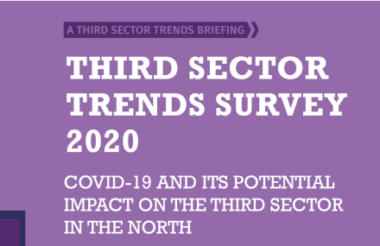Charities located in deprived areas of the North of England are more likely to see a fall in income as a result of the coronavirus crisis, a report has found.
Think-tank IPPR North analysed data from the Third Sector Trends Survey, looking at the financial resilience of civil society organisations in the North of England after the 2008 recession, to estimate what consequences the current crisis could have for them.
It found that while charities in the North have “proven to be highly resilient in the face of economic challenge”, they are also likely to see a significant income fall, especially if they are located in the poorest areas of the region.
Charities in poorest areas more likely to be hit
The report said that during the last recession charities in the more deprived areas were more likely to see significant income falls.
In 2010-12 a third of charities in the poorest areas of the region saw a significant income fall, compared with 15% of those in the most affluent areas.
The report says that Covid-19 has had a disproportionate impact on communities with the highest levels of inequality and deprivation, and that it is likely that the financial impact on charities will follow a similar pattern.
IPPR North estimates that there are 42,250 charities and social enterprises in the North of England, and that about a quarter of them are located in deprived areas.
More resilient than expected
The report also says that charities in the North have shown “high levels of resilience and adaptability” in face of economic challenges. This is thanks to a range of factors, such as their significant volunteer base, multiple income streams and diversity of the sector.
“Warnings about the collapse of the sector may therefore be premature and may actually be detrimental to the reputation of the sector,” says the report.
However, the impact of the 2008 crisis was “significant” and charities can expect an “even higher drop in income” this time.
The report also looks at the importance of different income streams for charities. Trading income went from representing 8% of overall income in 2008-10 to 15% in 2019. This could make Northern charities more vulnerable to the current crisis as retail and hospitality are hit by social distancing measures.
The report’s data comes from the Third Sector Trends Survey, which has been running since 2008 and is currently funded by Community Foundation Tyne & Wear and Northumberland. In 2019, it collected answers from more than 3,000 charities, representing 7.5% of all organisations in the North.
‘Cash flow is seriously under threat’
The report concludes by calling for support for the sector and proposing a series of measures, including targeted grantmaking to support charities and beneficiaries in the most deprived areas.
Sarah Longlands, director of IPPR North, said: “Charities, community and voluntary organisations provide the foundations for a strong and resilient Northern economy and continue to play a vital role in supporting communities during the current Covid-19 crisis.
“So we simply cannot ‘level up’ from the Covid-19 pandemic unless we ensure these organisations receive the support and the respect that they deserve to help weather this storm.”
Professor Tony Chapman of Durham University said: “Charities and social enterprises are more resilient than generally thought. They tend to be financially prudent and can adapt to circumstance.
“After the 2008 crash and years of austerity many showed this flexibility by generating more income from self-generated trading. But now, cash flow is seriously under threat because Covid-19 has limited their scope to run shops and cafes or charge for services.”
Manchester charities call for support
A separate report compiled by Macc, an organisation supporting civil society in Manchester, has published showcases how organisations in Manchester have responded to the coronavirus crisis.
No Going Back covers the work of 22 local charities during the crisis, looking at how they adapted and kept supporting their beneficiaries. It also calls for more funding for the sector.
In the foreword, Mike Wild, chief executive of Macc, says: “While there have been lots of very welcome small, short-term funds to support activities (and limited support from national government), these organisations cannot get by on that kind of income indefinitely."
He added: “There is a crucially important lesson to be drawn from the voluntary sector’s response to the Covid-19 crisis. That is that these organisations are part of the resilience of our communities and we need them to be there - and never more so than in a crisis.
“Manchester’s marvellously diverse vibrant, messy, gumption-filled, voluntary, community and social enterprise sector has risen to the challenge of the moment and we must build on this, invest in it or risk losing it altogether.”











